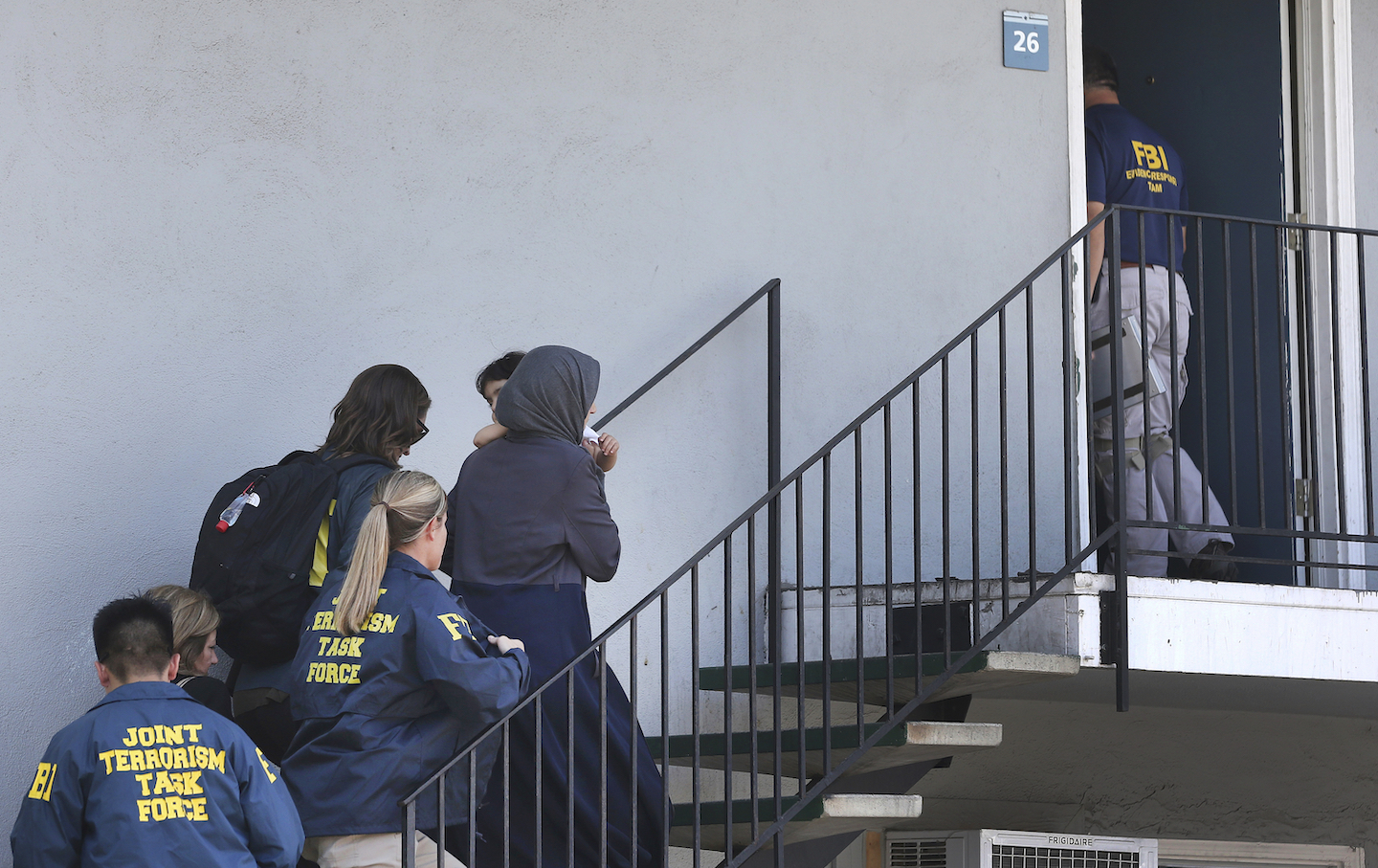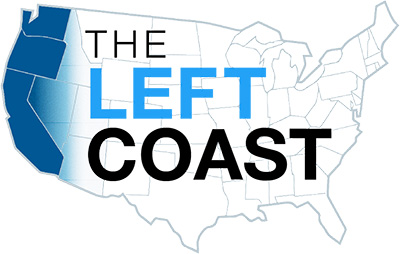
A woman carrying a child is escorted by authorities to an apartment following the arrest of a 45-year-old Iraqi refugee, Omar Ameen in Sacramento, Calif., August 15, 2018.(Rich Pedroncelli / AP Photo)

This week, two stories out of California grabbed my attention.
The first is a federal story. It is about a refugee, Omar Ameen, who has been in the United States since 2014. He was arrested in the summer of 2018, in Sacramento, where he and his family were living, and accused of being a senior figure in ISIS. The particular allegations, leveled by a mentally ill teenager and a man whose family has a vendetta against Ameen’s family, accused him of him having murdered a police officer in Iraq. That Ameen was a refugee made him a poster child for Trump’s anti-immigrant rhetoric, and the Justice Department and Trump himself, who at one point claimed that 300 refugees in the United States had open terrorism investigations against them, made as much hay as they could out of the allegations.
In court, however, where government lawyers argued for his extradition to Iraq—a country in which he would likely be tortured and then executed, his lawyers feared—the allegations fell apart. It turned out that, at the time he was supposed to have killed the policeman in Iraq, he was actually in Turkey. His cell phone records backed this up.
On April 21 of this year, two and a half years after Ameen was taken into custody, Judge Edmund Brennan, a US magistrate in Sacramento, dismissed the government’s effort to comply with Iraq’s extradition request for Ameen. The court ordered that he be immediately freed from the Sacramento jail, where he has resided for the past several years.
That should have been that. Except it wasn’t.
Instead of being released, Ameen was transferred to an ICE holding facility. Now, despite the protests of Sacramento Mayor Darrell Steinberg and several City Council members, the agency is moving forward with plans to deport, rather than extradite, Ameen to Iraq. He is charged with allegedly having lied about his father’s cause of death on the paperwork he filled in when applying for refugee status nearly a decade ago. His lawyers in the federal public defenders’ office have set up a website on his behalf, hoping to channel public unease at ICE’s actions into a lobbying effort to get local members of Congress to pressure the agency to reconsider their efforts.
From start to finish, there’s something entirely dystopian about Ameen’s case, from the reliance on non-credible informants to the behavior of ICE in the face of a court ruling urging the refugee’s release. It’s as dystopian as, to take another topic du jour, the GOP removing Liz Cheney from her leadership position this week because she had the guts to stand up against Trump’s ongoing assault on the democratic and constitutional process. Read about ICE long enough—or for that matter, the latest GOP shenanigans—and you’ll end up craving any sign that government agencies, can, and indeed sometimes do, behave in ways to benefit rather than harm ordinary people.
Which brings me to the second California story this week, this one far more optimistic in timbre. A little more than a decade ago, in the wake of the 2008 financial crisis, California had a budget deficit running to tens of billions of dollars, and was widely written off as having an entirely dysfunctional tax code and a budgetary process that promised too much to too many without ever finding the means to cover these obligations. Since then, the state has seen a remarkable fiscal turnaround. Now, in 2021, Governor Newsom, fighting for his career in the face of a recall campaign, is in the extraordinarily fortunate—and historically unprecedented—situation of having roughly more than $76 billion (some from California’s much higher than expected tax revenue this past year, the rest from federal legislation to counter the impact of the Covid pandemic) to allocate.
The ways that vast amount of money will be spent, centered around what the governor terms the “California Comeback Plan,” could well reinvent California’s social compact over the coming years.
Newsom is proposing additional $600 stimulus checks to most California taxpayers, as well as top-up $500 payments per child to families with children. He is planning to allocate a staggering $12 billion to efforts to finally get a handle on California’s spiraling homelessness crisis. Seven billion dollars of this will be used to convert old buildings into shelters or long-term affordable housing units.
The governor’s budget proposes spending close to $10 billion to cover pandemic-related unpaid rent and utility bills for low-income residents. Separate from the Comeback Plan, the governor has already signed into law legislation freeing up hundreds of millions of dollars in investments to tackle the growing threat of megafires in the parched West.
The chaos and cruelty of the Trump administration reaches new lows each week.
Trump’s catastrophic “Liberation Day” has wreaked havoc on the world economy and set up yet another constitutional crisis at home. Plainclothes officers continue to abduct university students off the streets. So-called “enemy aliens” are flown abroad to a mega prison against the orders of the courts. And Signalgate promises to be the first of many incompetence scandals that expose the brutal violence at the core of the American empire.
At a time when elite universities, powerful law firms, and influential media outlets are capitulating to Trump’s intimidation, The Nation is more determined than ever before to hold the powerful to account.
In just the last month, we’ve published reporting on how Trump outsources his mass deportation agenda to other countries, exposed the administration’s appeal to obscure laws to carry out its repressive agenda, and amplified the voices of brave student activists targeted by universities.
We also continue to tell the stories of those who fight back against Trump and Musk, whether on the streets in growing protest movements, in town halls across the country, or in critical state elections—like Wisconsin’s recent state Supreme Court race—that provide a model for resisting Trumpism and prove that Musk can’t buy our democracy.
This is the journalism that matters in 2025. But we can’t do this without you. As a reader-supported publication, we rely on the support of generous donors. Please, help make our essential independent journalism possible with a donation today.
In solidarity,
The Editors
The Nation
California hasn’t always lived up to its political promise. In this strange moment, however, the Golden State’s coffers are fuller than they have ever been before—in large part because of the fact that America’s super-wealthy, a disproportionate number of whom live in the state, have done super-well financially during the pandemic, meaning they ended up paying a lot more in taxes that was anticipated early in the crisis. That leaves progressives a window of opportunity to push for ambitious, transformational, changes.
If this past week is any indication, Newsom, looking to shore up his support in the months leading up to the recall vote, doesn’t intend to let the opportunity slide.
Sasha AbramskySasha Abramsky is The Nation's Western correspondent. He is the author of several books, including The American Way of Poverty, The House of Twenty Thousand Books, Little Wonder: The Fabulous Story of Lottie Dod, the World's First Female Sports Superstar, and most recently Chaos Comes Calling: The Battle Against the Far-Right Takeover of Small-Town America. Follow him on Bluesky at @sashaabramsky.bsky.social.